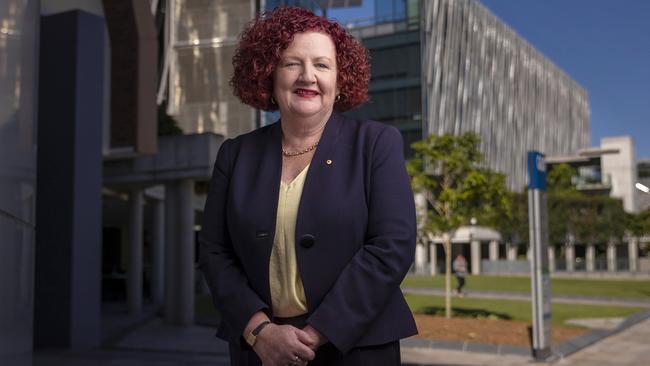Academic independence even more precious in the era of fake news
Universities must strive to strike the right balance in partnerships with private benefactors.

We have entered an era when uncurated information is widely available, increasingly pervasive and frequently damaging.
As the internet has disrupted the business models that supported quality journalism, the trust in universities to educate the consumers of information as well as generate new knowledge that is robust and fully tested has never been more important.
Underpinning the trust is the institutional autonomy to enable a community of scholars to develop expertise and explore ideas without fear or favour: we call this academic freedom.
The notion of academic freedom dates back hundreds of years and arose from the intersection of church and state and the rise of science. One of the earliest examples of a public outcry about intellectual freedom occurred when Christian Wolff, professor of mathematics and physics at the University of Halle, was banished in 1723 by one Prussian monarch and restored (as vice-chancellor, no less) by another in 1740.
As European universities developed, the principle was also applied not just to individual scholars but to freedom for academic institutions to manage their own affairs.
In the US, where private universities were established and controlled by boards of trustees and donors, a series of high-profile dismissals (again, when science came into conflict with religion) resulted in the formal adoption of the principles of academic freedom by the American Association of University Professors in 1915.
It is useful to recall that with freedom comes responsibility. Academic freedom is both a professional privilege and a means of ensuring that expertise is not subject to external influence. Academic freedom does not extend beyond that expertise or to all settings: it is a function of one’s specific academic work, and is circumscribed by the content and context of that work.
It is a privilege that also relies on a well-established and extensive apparatus and network that exposes academic work to the judgment and scrutiny of peers, through proposals for funding, publication, presentation and testing and retesting of ideas and findings. It is not, to quote the former dean of law at Yale, Robert Post, “the freedom to practise politics or politically indoctrinate students”.
Nor is it an excuse for poor quality work, nor does it provide the freedom to make claims in the public domain that have not been subject to the kind of routine scholarly scrutiny outlined above.
In Australia, where the majority of universities and funding bodies are publicly funded, questions of institutional autonomy in the past usually centred on perceived or actual interference by government.
One of the most spectacular examples of the latter occurred in 2005 when the then minister for education, science and training, Brendan Nelson, intervened to deny funding to nine Australian Research Council research grants that had successfully traversed the rigorous and highly competitive expert peer review process. This followed sustained press commentary, particularly aimed at the humanities.
In view of the current inquiry into the funding of research, it is important to recall that this intervention, within the provisions of the ARC Act, seriously undermined confidence in the peer review system that drives the entire research enterprise. It devalued the many thousands of unpaid hours spent reviewing grants and manuscripts by the nation’s leading experts across all disciplines; and it signalled to a generation of researchers that a proposal that merited funding could be turned down if they worked in an area that was not well understood, or was unpopular with the government of the day.
In Britain, by contrast, the Haldane principle — which dates back to 1909, and holds that scientific and research granting decisions must be made by experts, not politicians — is so well established that it was recently enshrined in legislation by the Conservative Universities and Science Minister Jo Johnson.
Although it is still not protected by legislation here, the ministers who followed Nelson — to whom I reported as chief executive of the ARC — Julie Bishop and Kim Carr, each gave and honoured commitments not to interfere with the work of the expert panels.
As the proportion of government funding of Australian universities has declined, new challenges are arising as universities appropriately reach out to engage new student markets, corporate partners and private benefactors, to expand the applications of research and provide more opportunities for our students.
Striking the right balance in these partnerships requires clear expectations upfront in respect of the nature of the support, the possible outcomes, and the appropriate checks to be put in place on the extent to which universities can be influenced by those providing the funding.
In my experience, most prospective funders understand that the appropriate forum for debate on curriculum is within the academic boards, not the popular press or the corporate boardroom.
Similarly, the findings of sponsored research must be appropriately scrutinised to be valuable to the sponsor, who should and invariably does understand that rigorous findings that can stand up to scrutiny are the point of engaging in the research in the first place.
Finally, to paraphrase another saying, I suspect there would be less concern about universities’ capacity to influence the politics of the next generation if it was recognised how little influence we actually have.
Our students are very good at voting with their feet or through formal evaluation surveys when they think that a lecturer is not delivering an intellectually rigorous curriculum.
Our role as educators is to provide a broad set of contemporary curriculums, to educate out students to develop and test scientific hypotheses, and to ensure our institutions are sufficiently intellectually robust to accommodate institutes for Eastern religions and cultures alongside the traditions and scholarship of the West.
Margaret Sheil is vice-chancellor of the Queensland University of Technology.


